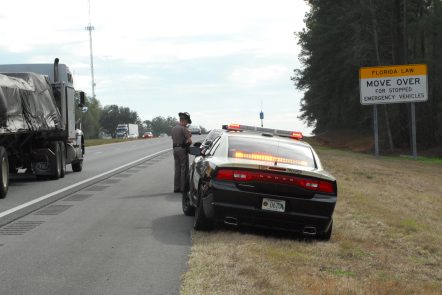
Move Over Law: Life Saver Or Income Generator
May 21, 2014
A recent Atlanta TV station report interviewed Atlanta area drivers who received tickets for failure to comply with Georgia’s Move Over Law and seems to question the motives behind the enforcement of that law, especially in certain Atlanta metro counties.
For those unfamiliar with this law and, according to a 2007 survey, that’s approximately 70% of you, the Move Over Law was designed to protect emergency workers and first responders who are working on the side of the roadway. Since 1999, 213 law enforcement officers have been struck and killed while aiding motorists on the side of the roadway, an average of more than one per month.
The need for the law was re-emphasized recently by the death of a veteran Florida Highway Patrol officer and mother of a four year old boy. While working a crash scene on a Florida interstate, Trooper Chelsea Richard was struck and killed when a pickup truck traveled onto the shoulder of the road and struck her patrol vehicle. A tow truck operator and pedestrian were also killed.
A version of the Move Over Law has been enacted in all 50 states and requires motorists who encounter an emergency vehicle on the side of the roadway, with its emergency lights flashing, to move over into a lane away from that of the emergency vehicle or, if it’s impossible to move over into the opposite lane, to slow down to a safe speed. Kansas passed the first Move Over Law in 2000, and Hawaii became the 50th state to enact a version of the law in 2012.
The problem with the law, as written in some states, is that it is vaguely worded. Georgia’s law requires that motorists who are unable to move over into another lane “reduce the speed of the motor vehicle to a reasonable and proper speed for the existing road and traffic conditions, which speed shall be less than the posted speed limit, and be prepared to stop.”
The drivers cited in the TV report claim that they had slowed down but were issued tickets anyway. While they felt that the purpose of the law is necessary, they felt it was being misinterpreted by some law enforcement agencies and some, based on the number of tickets written in certain Georgia counties, feel that those counties are subverting the intent of the law to generate extra income for county coffers.
Other state Move Over Laws are less vague. Florida’s law requires that motorists who are unable to move over into another lane “Shall slow to a speed that is 20 miles per hour less than the posted speed limit when the posted speed limit is 25 miles per hour or greater; or travel at 5 miles per hour when the posted speed limit is 20 miles per hour or less. That requirement is easily understood by motorists and can be measured by law enforcement officers.
Florida’s law not only includes emergency vehicles such as police and fire but also tow trucks and a recently passed amendment to the law will include sanitation vehicles (garbage and recycling trucks) and utility service vehicles (water, gas, electric, or cable) that are parked by the side of the road with emergency lights flashing. Basically, in Florida, if you see any vehicle parked by the side of the road with blue, red, or amber lights flashing, you should treat it as an emergency vehicle and know that the Move Over Law applies.
